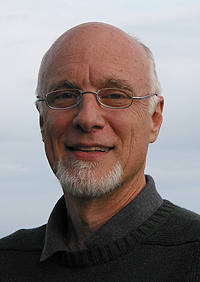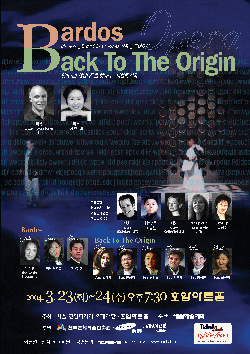|

 


|
April 5, 2004
Music faculty travel to Asia over spring break
for Korean premiere of professor’s first opera
By Scott Rappaport
Three UCSC music faculty had a rather unusual experience over spring
break.
|

Music professor David Evan Jones, above, just returned from
Seoul, Korea, where he supervised the Korean premiere of his first
opera: “It was an amazing experience. We kept recalling the
movie Lost in Translation—there were so many interesting
misunderstandings.”
Photo by Scott Rappaport
|
David Evan Jones, Nicole Paiement, and Brian Staufenbiel traveled
to Seoul, Korea, to oversee the Korean premiere of the chamber opera
Bardos, for which Jones wrote the music and libretto. Bardos
appeared in a double bill with Back to the Origin by renowned
Korean composer Chan-Hae Lee, whose work was performed last spring at
UCSC’s Pacific Rim Festival.
Both operas were produced by the Seoul Contemporary Opera Company and
staged on March 23-24, before an audience of approximately 1,000 people
at Hoam Art Hall in downtown Seoul. Paiement, professor of music at
UCSC, served as guest conductor and Staufenbiel, a UCSC music lecturer,
functioned as guest stage director. Bay Area mezzo soprano Lisa van
der Ploeg played the central role in Bardos, and Olympia, Washington,
choreographer Doranne Crable directed the production’s Butoh dancers.
“It was an adventure, an amazing experience,” said Jones,
who has taught music theory and composition at UCSC since 1990. “We
kept recalling the movie Lost in Translation--there were so many
interesting misunderstandings. We came to the country knowing no Korean,
and though we did learn a few words, most of our communication was in
English and German. Our hosts were extremely gracious in facilitating
the communication that made the production possible.”

This is the poster used in Korea to advertise the event. |
Although the performances were booked last November, advance rehearsal
for Jones’s opera was literally impossible because most of the
performers resided in Korea. In addition to the solo mezzo soprano,
the cast included a 14-member women’s choir, three percussionists,
an organist, pianist, actress, and three dancers. Adding to the pressure
was the fact that Paiement and Staufenbiel acted as conductor and stage
director for the other production as well. As a result, the UCSC contingent
embarked upon a nonstop rehearsal schedule from the moment of its arrival
in Asia.
“We virtually did not get off the university campus where we were
staying in Seoul for the first eight days,” Jones recalled. “Along
with the casts of both operas, we just stayed and worked. Nicole and
Brian broke the production up into parts and put it back together again,
while I advised and assisted in any way I could. It was an extremely
narrow time frame in which to prepare two staged operas--both casts
worked hard to pull it together.”
Jones said he was inspired to write his opera by a vivid dream he had
after his mother died. The title Bardos refers to the stages
that the soul passes through after death according to the Tibetan
Book of the Dead. The opera was sung in English and Latin, with
two monologues for an actress that were delivered in Korean, translated
from the original English. This created a bit of a problem as Jones
and Staufenbiel attempted to coach the actress in rehearsals.
“She didn’t speak English,” Jones recalled. “So
the singer would translate our English instructions into German, which
the Korean pianist would in turn translate into Korean for the actress.
Of course, our comments were based on guesses about the pacing of the
text and how it would read in Korean culture as compared to American
culture,” he added. “We just hoped our instructions—such
as to slow down, or to emphasize certain emotional states--were understood
and carried the meaning we intended for the Korean audience.”
Jones noted that the final performances were quite well received, but
said the real highlight of the trip was the process of bringing together
diverse cultural and professional styles in a collaborative effort.
Staufenbiel, director of UCSC’s opera program, agreed that despite
the frenetic schedule, he would do it all over again.
“Korea was an extraordinary experience, a mixture of ancient society
and modern Western culture—palaces and shrines, neon lights, and
cell phones,” Staufenbiel said. “And the people were wonderful
to work with—talented, dedicated, and kind.”
Return to Front Page
|
|